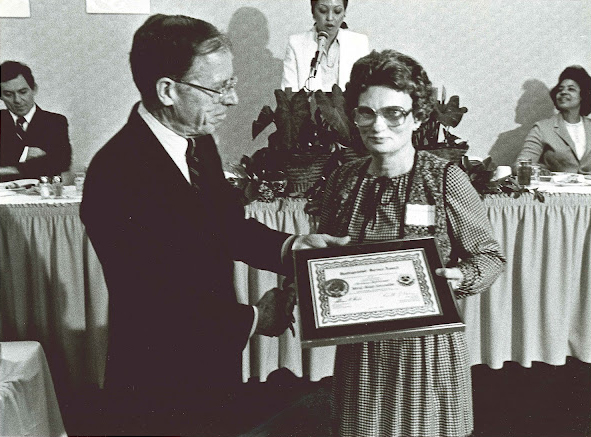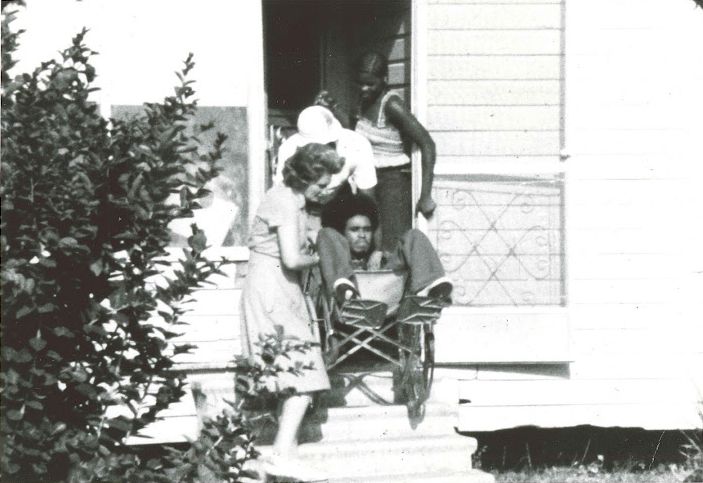“I thank God when I stand on the porch of my three-room shack watching two of my six children go to pre-school,” one woman wrote to CRWRC in 1986. “I am 26 years old, and I want them to have a better life than I’ve had. Thank you for providing Mississippi Christian Family Services with the resources to help me.” This woman’s story is a great reminder that sometimes it is as important to address needs at home as it is to respond to needs abroad. In 1974 CRWRC staff member, Elvinah Spoelstra, returned from Korea where she had spent eight years leading the Christian Adoption Program of Korea (CAPOK). Upon her return to the United States, Elvinah’s social work background drew her to one of the poorest areas of the United States – Sharkey and Issaquena counties in Mississippi. She found that many social agencies were already at work serving many segments of the population, yet there was one group for whom there were no programs – the physically and mentally disabled.
“I thank God when I stand on the porch of my three-room shack watching two of my six children go to pre-school,” one woman wrote to CRWRC in 1986. “I am 26 years old, and I want them to have a better life than I’ve had. Thank you for providing Mississippi Christian Family Services with the resources to help me.” 
This woman’s story is a great reminder that sometimes it is as important to address needs at home as it is to respond to needs abroad. In 1974 CRWRC staff member, Elvinah Spoelstra, returned from Korea where she had spent eight years leading the Christian Adoption Program of Korea (CAPOK). Upon her return to the United States, Elvinah’s social work background drew her to one of the poorest areas of the United States – Sharkey and Issaquena counties in Mississippi. She found that many social agencies were already at work serving many segments of the population, yet there was one group for whom there were no programs – the physically and mentally disabled.

In the late 1970’s, public schools in this region of Mississippi were unable to accommodate the special needs of those with disabilities. At the same time, there were no other training programs available in the community to help children learn or develop their skills. As a result, children with physical and mental disabilities were often unable to talk, dress themselves, or play with other children. They were confined to their homes, and their parents were left to struggle on their own to meet their children’s many needs.

Elvinah began planning. In late 1975, with CRWRC support, Mississippi Christian Family Services (MCFS) opened its doors to five children with developmental disabilities in Rolling Fork, Mississippi. This racially integrated program was the first of its kind in that area, and marked the first time since the Civil War that children of different races were learning together.
The children received training from the school and were encouraged to develop their abilities and independence. Over the years, through the patient one-on-one attention of MCFS’ 17 full-time and 11 part-time staff, many children learned important life skills – talking, socializing, dressing, and even reading.
MCFS also expanded. To the school program, MCFS added a day-care program for younger children to help them get on the right path for a lifetime of learning. Adults with disabilities participated in MCFS workshops, where they learned basic skills, developed their self-confidence and earned an income doing small contract jobs for area businesses. A home-bound program was also started to provide assistance to people whose disabilities kept them confined.
Recognizing the need for local ownership and a representation of the local community within the organization’s leadership, CRWRC and MCFS encouraged diversity on the board of directors. The racially-integrated board was the first of its kind in the area and helped to build a strong base of local support from all races.
Throughout this process, CRWRC provided financial support and volunteer experience. In 1982, 190 CRWRC volunteers helped renovate MCFS’s new headquarters. CRWRC then began to transition support of the organization over to that local board so that by 1985 it was running as its own separate entity. Today, MCFS serves 231 clients through a day habilitation program, supervised community living and a resident group home in addition to programs in money management, vocational skills, and work placement.
